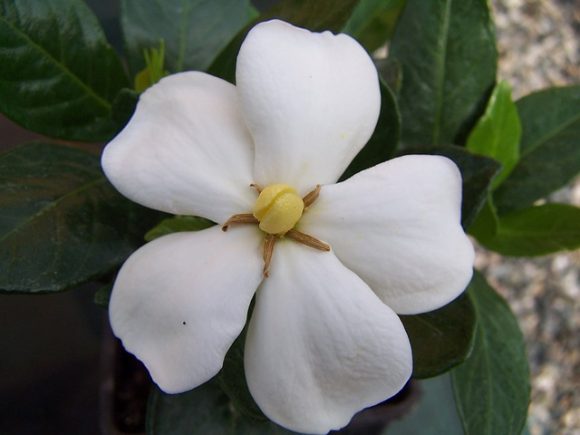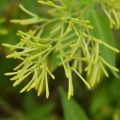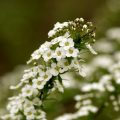- The Miraculous Shiny Bush Plant - January 18, 2021
- Colorful, Edible and Medicinal Celosia - January 10, 2021
- Radish, a Nutritional Power House - December 19, 2020
Gardenia, or cape jasmine, and botanically known as gardenia jasminoides, is a flowering shrub belonging to the rubiaceae family. It is closely related to cinnamon and your aromatic, bitter-sweet morning brew: coffee. It is native to Asia especially China, Japan, Vietnam, Myanmar, and India. Today, the plant has spread to other regions including Europe and the US.
[Note: The Right Flowers is not a medical site. Knowledge of and information about the therapeutic benefits and applications of flowers, while known through the ages, does not constitute medical advice. If you are having health issues, you should consult with a physician.]
Gardenia has green, shiny leaves and highly fragrant white blossoms. The plant is commonly cultivated in tropical and subtropical gardens. In addition, gardenia makes for a great indoor plant as long as you can simulate its natural habitat.
The name gardenia is said to have been attributed to Alexander Garden, a physician, botanist and zoologist who lived in South Carolina and was instrumental in the classification of various plants.
In China, gardenia has been cultivated for centuries but was only introduced in European gardens in the 18th century. Historically, gardenia symbolizes devotion, purity, trust, love, and refinement. These qualities explain why gardenia flowers are commonly used in wedding bouquets.
For years, people have extracted essential oils from gardenia flowers. The oil extracted from gardenia flowers is rare compared to famous oils such as jasmine, lavender, and rose. Gardenia oil is commonly used in Ayurveda, yoga, beauty and cosmetics industries.
Traditionally, perfumers and herbalists extracted gardenia oil using odorless animal fats via a process known as the enfleurage method. The oil was then separated from the animal fats using alcohol. Extracting the oil using this traditional method takes several months which makes the oil expensive and out of reach for most people.
Gardenia’s essential oil has a strong, sweet, seductive, alluring aroma with floral notes. The oil is commonly used in wedding ceremonies due to its sweet, innocent, seductive properties. It pairs well with other essential oils such as lavender, jasmine, citrus, ylang-ylang, and bergamot.
Phytochemical evaluation of gardenia flowers indicates that they contain more than 20 compounds that are ideal for combating modern health threats. The oil contains linalool, benzyl, ursolic acid, phenyl acetates, terpineol, stigmasterol, rutin, phenylpropanoid glycosides, and crociniridoids.
Gardenia health benefits include:
Boosting moods and alleviating anxiety
Gardenia oil has been used to help people suffering from depression and anxiety for years. Studies show that the oil triggers chemical responses in the brain that regulate emotions and moods.
Antibacterial
Gardenia flower oil has strong antibacterial effects making it ideal for treating bacterial problems such as tetanus, sepsis E.coli, and salmonella.
Inflammatory
Gardenia is rich in antioxidants. These are compounds that help in reducing the effects of free radicals. In addition, the oil contains genipin and geniposide; compounds with anti-inflammatory properties. It is also good for reducing cholesterol, glucose intolerance, and liver damage.
While gardenia may never outshine coffee in popularity, it is a great flowering shrub to have in your garden for ornamental and herbal reasons.





